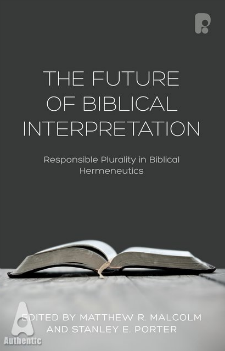The Future of Biblical Interpretation
Responsible Plurality in Biblical Hermeneutics. Edited by Stanley E. Porter and Matthew R. Malcolm
 The Future of Biblical Interpretation
The Future of Biblical Interpretation
Responsible Plurality in Biblical Hermeneutics
Edited by Stanley E. Porter and Matthew R. Malcolm
Paternoster 2013
ISBN 978-1-84227-788-1
Reviewed by: Paul Goodliff
As Christians wrestle with contentious issues and find themselves in disagreement, it is not very long before recourse to biblical texts becomes an epicentre of controversy. Notably today, issues of human sexuality loom large in such debates, and the interpretation of Scripture, especially the degree to which there might be a legitimate variety of readings, is central to those debates. Is there only one interpretation allowed, or might there by a range of interpretations held by those engaged in the debate? If there is only one, or at least one that is privileged, who decides what that should be, and can it change over time?
Hermeneutics has been central to these issues, and this collection of papers edited by Stanley Porter and Matthew Malcolm is to be welcomed as a valuable contribution to the hermeneutical challenge. It should be remembered that the church has often lived with a variety of interpretations of Scripture, be that Augustine’s recognition that ‘God has tempered the sacred books to the interpretation of many, who could come to see a diversity of truths’ (Confessions XII.31.42), or the multivalent ‘fourfold’ exegesis of the Medieval period, embracing literal, doctrinal, moral and spiritual readings.
Perhaps it has been a result of the Enlightenment’s totalizing of knowledge through Reason that the church has lost some of this rich variety. Evangelicals certainly have emphasised the historic-critical interpretation, seeking the ‘original’ meaning of Scripture, in common with most other approaches, but have often then become stuck there.
The papers found their first outing at a conference at Nottingham University in honour of Anthony Thistleton, doyen of all things hermeneutical from his doctoral thesis (published at The Two Horizons... a book I suggest sits unread on the shelf of many a minister of my generation!) to more recent books on dogmatic hermeneutics.
I found Anthony Thistleton’s discussion of plurality, by recourse to Bakhtin’s notion of ‘polyphonic voices’ stimulating, as is Stanley Porter’s wrestling with precisely the two questions asked above: what did this text mean when it was composed by its original author, and what does it mean for us today?
Richard Briggs helpfully continues this discussion by asking how different approaches (feminist, Marxist, Anglican, perhaps) can enter into dialogue. This is recognised by Briggs as being perhaps an especially Anglican approach, holding together creative diversity, rather than an approach that favours ‘the right’ interpretation. Other contributors include james Dunn, Robert Morgan and Walter Moberley.
For anyone wanting to wrestle themselves with questions of how to interpret Scripture, how to responsibly handle the Bible and be alert to the ecclesial challenges before us now, and in the future, will benefit from reading this book. That must have quite a conference, and I am glad that its stimulation is now available to this wider audience.
The Revd Dr Paul Goodliff was the team leader of the Ministries Team
Baptist Times, 12/09/2014